- 当前位置:
- 首页>
- 活动>
- ������������
������������
CCG持续关注国际关系议题,推动中国与全球化的发展,积极开展国际交流,充分发挥智库“二轨外交”作用,在巴黎和平论坛、达沃斯世界经济论坛、慕尼黑安全会议等重要国际政策与意见交流平台上组织分论坛、边会、圆桌会议、晚宴等活动,促进国际政商学界对话,凝聚共识;CCG积极与各国政界、智库界、工商界开展“二轨外交”活动,每年常态化赴多国调研与交流,促进中外关系攸关方互动,保持与多国政策圈层的沟通渠道。
-
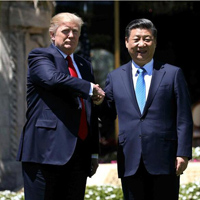
【人民网】国际观察:寻求稳定、均衡、共赢的中美关系
人民网北京11月3日电 近日,《CCG赴美调研报告:寻求稳定、均衡和共赢的中美关系》发布会暨研讨会在中国与全球化智库北京总部举行,当前正值美国总统特朗普访华前夕,中美问题专家学者就新时代中美关系的走向进行了深入讨论。学者认为,中美关系大局基本确定,双边关系处于平稳发展、互利互惠的状态。能源贸易将是平衡中美贸易关系新的增长点。中美关系大局稳定 继续平稳健康发展 中国国际问题研究院美国研究所所长滕建群认为,中美两国元首海湖庄园会晤稳定了双边政治关系,今年4月之后中美关系一直处在稳定的状态。中国对此次特朗普访华十分重视,双方在政治层面关系稳定后,中美两国将在经贸、人文交流和安全合作等领域会有更大的发展。 “中美关系大局基本确定,双边关系处于平稳发展、互利互惠的状态。”对外经济贸易大学国际经贸学院教授卢进勇说,回顾中美之间近40年的发展史,双方虽然出现过小的争端和矛盾,但是大的格局不断向前发展,双边关系不断加强,联系的领域也越来越广。中美都是大国,双方要秉承“亲诚惠容”的外交理念,更多关注双边大局的发展,并为此多做努力。 对外经济贸易大学国际经贸学院崔凡教授对未来30年中美经贸关系同样充满信心。就大的国际格局来说,他认为中国和美国在某些问题上会有共同点,比如全球经济治理问题。他还提到,今年年底或明年年初,中国将会迎来一轮开放新高潮,特别是服务贸易领域,这将有利于中美经贸发展。双方将签大单协议 能源投资引人关注 据悉,特朗普访华期间,美国商务部部长罗斯将率商务代表团随团到中国访问,与中方共同举办相关经贸活动,并且要签署一些商业性的合作协议。其中最引人关注的就是美国的能源投资,尤其是天然气和其对减少贸易赤字的作用。 中国社会科学院美国问题专家吕祥就能源问题发表了看法,他提到此次跟随特朗普访华的40家企业种共有10家企业涉足天然气或其他能源领域,其中最有名的就是美国液化天然气出口终端开发商。美国西海岸出口天然气终端港口尚属空白,中美双方需要在美国西海岸修建出口天然气终端港口的规划问题上展开商谈。此外,中美之间可以通过贸易、能源、基建一体化的合作方式展开合作,此次特朗普访华很有可能是完成这一合作的第一步。 能源贸易是平衡中美贸易关系新的增长点,如果美国能够在能源出口基础设施上加大投入或与中方在相关基础设施建设上展开合作,为中方资本投资包括西海岸天然气设施在内的能源基础设施提供便利条件,将大大有助于平衡“对华贸易赤字”,也可带动美国传统产业的复兴和发展。建立更准确的衡量标准 改变对美中贸易逆差偏见 中国国际问题研究院美国研究所所长滕建群就美方目前最为关注的“中美贸易不平衡”问题提出了自己的看法,他指出,美国媒体和政府的统计数字并不全面和准确,中美贸易逆差问题显得尤为突出其根本在于美国。华尔街的商人们没有对所赚利润进行再分配,所以美国普通百姓和中产阶级并没有得到好处。 由于中美两国处在全球产业链的不同区域,两国分工和在其中获益的地位存在不同。美国跨国企业的全球产业链布局使得产品的相当部分元器件是从他国进口到中国,最终到达美国的出口价值被记录成中国的出口,实际利润大部分由美国企业拥有。这种所谓的“中美贸易的不平衡”是在统计实物贸易的基础上得出的结论,严重扭曲了国与国之间贸易平衡的真实情况。 中方要创新统计方法和标准,调整统计方法,并对中美贸易的真实情况展开宣传,最终取得美国政府和社会各界的认可。文章选自人民网,2017年11月3日
2017年11月7日 -
王辉耀:推动建立稳定、均衡和共赢的中美关系
王辉耀,全球化智库(CCG)理事长 美国总统特朗普首次访华在即,此次特朗普应习近平主席邀请首次对中国进行国事访问,对中美关系意义重大,对世界也将有深远影响。 习近平总书记在十九大报告中提出“坚持对外开放的基本国策,坚持打开国门搞建设”,并指出要构建总体稳定、均衡发展的大国伙伴关系构架。中美两国作为世界上两个最大的贸易国、最大的经济体,两国经贸关系不仅影响两国的经济发展,也对世界经济发展起到重要的作用。我们要维护中美合作的整体局面,以争取合作共赢为基调有效管理两国经贸关系,推动中国成为社会主义现代化强国。中美合作,可从中美基建、投资、人才、网络和太空合作等方面着手,努力构建出共赢合作的大国关系。(一) 探讨成立中美基础设施投资基金,推动中美在基建领域合作,邀请美国加入到亚投行和“一带一路”建设中来 我们在实地走访“美国进步中心”时就看到了他们为重振美国基础设施和工业而提出的《新马歇尔计划》报告。在特朗普总统对美基础设施改造的大战略下,中美在基础建设投资领域的合作有广阔的合作前景:在过去10年,中国在基础设施领域累积投资达到11万亿美元,这几乎是特朗普总统1万亿美元基础设施投资规划的11倍。因此,中国的资金无疑将有力助力特朗普政府的基建规划,从而推动美国的经济发展; 对于中国而言,中美基建合作也将有利于中国的企业积累海外经验,从而更好地实现“走出去”战略。同时,中美基建的投资也将带动中美两国包括设备制造、工程建设以及高科技等企业的发展,并将为双方的公共机构与私营部门合作的公私合营(PPP)模式开拓更多的市场和机遇; 此外,中方还可以借此邀请美方加入亚投行并参与到 “一带一路”倡议下的第三方市场的开发合作建设中来。中国倡议组建的多边金融组织亚投行对亚洲乃至全球的基础设施建设必将起到推动和示范作用,与特朗普总统提出的改造美国基础设施建设的设想十分契合。美国的加入有助于对美国基础设施的投资,也同时提升亚投行的国际影响力,为中美合作开发第三方市场带来机会。 中美推进基础设施合作需要克服保护主义思路,通过加强接触,对各自的投资环境、企业能力和社会环境形成相对客观的认识。双方在企业交流、金融资本合作、政策沟通和政府互动、第三方合作、智库合作建言献策等领域加大力度,借鉴欧洲引进外资和外国企业建设基础设施的成功经验,优化美国国内的PPP项目操作环境,以重点项目、标志性项目为突破口,为中美未来合作提供务实的成果、打造良好的环境。(二)中美双方可以共同推进亚太自贸区(FTAAP)的建立 美国退出TPP, 东盟主导RCEP各方拉锯停滞不前,在当前全球经济发展还不稳定的背景下,中美两国应该积极寻求突破共同推动世界自由贸易的发展。 亚太自贸区能为中美两国在经济和社会效益上创造更多价值。中美两国应该在全球经济、安全以及能源和环境治理上发挥更大的作用。同时,鉴于特朗普总统在北美自贸区协定的趋软态度,美国可能重新回归亚太,并且重新开启太平洋地区的贸易协定谈判。中美都需要类似亚太自贸区的平台,共同倡导更完善合理的21世纪经济规则。 亚太经济一体化的推进和自贸区成立有助于消除贸易投资壁垒,为中国企业在亚太投资创造更良好的政治环境和政策支持。亚太地区价值链和供应链发展和整合可以减少区内企业投资的成本,提高经营成功率。(三)加大对美国的石油、天然气、农产品、商务客机等的进口,积极促进美方放松对华技术出口管控以缩减中美之间的贸易差额 2015年,美国天然气产量达到了7670亿立方米的峰值。美国能源信息局预测,到2020年,美国将拥有世界第三大天然气出口能力,仅次于澳大利亚和卡塔尔。能源贸易是平衡中美贸易关系的新增长点,如果美国能够在能源出口基础设施上加大投入或与中方在相关基础设施建设上展开合作,为中方资本投资包括西海岸天然气设施在内的能源基础设施提供便利条件,将大大有助于平衡“对华贸易赤字”,也可带动美国传统产业的复兴和发展。 中国、美国是世界上最大的农产品进口和出口国。据中国农业部统计,中美农产品贸易2006-2016年年均增长达15%,2016年中国进口了210亿美元的美国农产品,成为美国农产品的最大单一出口市场。自海湖会之后启动的中美全面经济对话开展之后,中国恢复了美国的牛肉、大米的进口,美国智库估计,牛肉、大米将与玉米、大豆一起成为美国对华出口的“拳头产品”。 中美农产品贸易近十年来尽管增长迅速,但仍有很大潜力可挖。 在未来的20年里,中国将需要至少5000架民用飞机,波音交付的客机中的25%是给中国客户的。在短期内中方可适量增加波音飞机进口,要求波音扩大与中国合作,要求美方再进一步放开对华高科技产品的出口限制。 在今年7月中美全面经济对话(CED)欢迎午餐会上的演讲中,中国国务院副总理汪洋指出,受美方陈旧的出口管制法规政策影响,美国企业没有获得应有的“蛋糕”。以集成电路为例,去年中国进口总额高达2270亿美元,但美国只占4%的份额。美国对华技术出口的限制也一直是阻碍中美贸易平衡的一个重要原因。 此外,根据卡内基国际和平基金会今年4月的报告,如果美国将对华出口管制程度降至对巴西的水平,对华贸易逆差最多可缩减24%;如果降至对法国的水平,最多可缩减34%。 因此中方在扩大对美部分产品进口的同时,也应该积极寻求美方放松对华的高技术产品的出口限制,指出这种限制给美方造成的重大损失,以及由此带来了一定程度上双输的结局。(四)中美尝试在太空、人才等领域加强合作,为全球治理创造正面事例 在中国2022年前后建成载人空间站之后,如果国际空间站在2024年按照计划退役,那么届时中国将成为唯一拥有空间站的国家。中美空间合作将朝向有利于中国的一方。太空领域属于全人类,中国应该站在人类命运共同体的角度上来积极推动中美太空合作。美方也应该摈弃之前的封锁思维,通过太空领域的合作来给中美两国乃至全人类带来利益。 美国作为一个典型的移民国家,当前仍旧是世界最大的移民接收国,尤其是对高技术高水平人士的吸引力一直处在国际的领先水平。在全球化不断深入,国际人才流动不断增强的时期,成立一个国际人才组织是十分必要和迫切的。 中国现在已经是一个人才大国,也是一个贸易流动大国、资本流动大国。贸易流动领域有WTO进行全球治理,资本流动领域有IMF国际货币基金组织,但人才流动国际上还没有一个全球性的组织,学历的互相认证、工程师资格的认证、甚至未来移民的配额、留学生的管理等,特别需要一个国际组织来协调,探讨如何进一步做好这方面工作的管理和提升。中美双方可以在这个领域里积极配合、加强合作,既有利于中美双方,也有利于全球各国人民。(五)认真核查中美双方在当前贸易统计标准和方式的不足和不同,努力确立新的衡量标准,积极改变美方对中美贸易巨大差额的错误认知 由于中美两国处在全球产业链的不同区域,两国的分工和在其中获益的地位自然不同。很多美方的跨国企业实际上处在产业链的顶端,中国处于中间。它们的全球产业链布局使得产品的相当部分元器件是从他国进口到中国,最终到达美国的出口价值就被实实在在的记录成了中国的出口,实际利润大部分由美国企业拥有。这种所谓的“中美贸易的不平衡”都是在统计实物贸易的基础上得出的结论。这样的统计方法严重扭曲了国与国之间贸易平衡的真实情况。 日本国立政策研究大学院大学邢予青教授研究指出当前跨国公司的主要收益来自于其无形智慧产权的附加值。他以在中国设厂生产的苹果公司为例,指出根据传统海关统计,苹果公司2015年海外市场取得的1400亿美元的收益都不计入美国的出口。如果将苹果公司在大中华区获得的附加值收益计入美国的出口,那么美对大中华地区的出口就增加13.1%,双边的贸易赤字就会缩减6.7%。而这只是苹果一家公司。 因此中方要创新统计方法和标准,调整统计方法,把中美贸易的真实情况开展宣传,最终取得美国政府、社会各界的认可。(六)突出两国服务贸易在双边贸易中的地位,继续加大中美两国在旅游、留学、移民等领域的合作 长期以来中美之间以旅游、留学和技术移民为代表的服务贸易一直被忽略。而这部分贸易美方一直保持顺差。2016年,美国在教育、旅游、知识产权、交通、商业、金融等服务贸易上,对华的顺差为557亿美元,是2006年的40倍。根据商务部今年5月发布的《关于中美经贸关系的研究报告》在中美服务贸易中,根据中方统计,2016 年中国对美服务贸易逆差高达 557 亿美元,占中国服务贸易逆差总额的23.1%。 以教育为例,根据美国国际教育协会(IIE)的数据,2016年中国留学生在美国的人数为32.85万人,中国在其生源国中排名第一,占美国留学生比例的31.5%。 从2010年到2015年,中国赴美留学生增加了近3倍,达到30万人,以2016年中国留学生人均在美国年花费4.5万美元计算,中国留学生一年为美国带来了约159亿美元的收入。相比之下,来华留学的美国人只有2万。 根据美国商务部今年8月发布的数据,2016年中国内地游客到访美国的人数达到近300万,增长了15%,消费支出330亿美元,上升了9%。,中国内地到访美国的游客数量已连续13年增长,其中12年都是两位数的增长,而且从2005年至今中国内地游客人数已经增长了十倍。同时,中国内地游客在美旅行支出排名第一,2016年共消费了330亿美元。 根据美国EB-5投资移民行业协会IIUSA的数据,2016财年,各国申请EB-5申请总数为13273件,其中,中国家庭占10948件,占比达到82.48%,中国大陆的投资人仍是申请EB-5的主力军。根据EB-5投资移民的最低金额为50万美元。 从以上数据可以看出,中国在留学、旅游、投资移民等方面的服务贸易都处于逆差的状态,我们在向美方以及公众介绍和说明之外,也应该积极谋求在这些领域的变革。改善国内的教育、旅游以及投资创业环境吸引更多的美国学生、游客以及企业界尤其是创业者来华,从而逐步改善在服务贸易上的不利地位。(七)以钢铁企业为代表,中方积极引导中资企业赴美进行绿地投资,增加当地就业应合特朗普政府竞选回馈诉求,同时提升中资企业的国际竞争力 根据美中关系全国委员会和荣鼎集团联合发布的报告,2015年中国企业赴美直接投资超过150亿美元,其中绿地投资呈现快速增长的态势,交易金额达到18亿美元,同比增长34%。 目前,中国企业在美国附属公司数量已超过1900家,在美国42个州开办有业务,总雇员人数达到9万人,3年增长了3倍。 中国企业在美设厂,一可以有效利用美国的能源,二可帮助中国企业实现全球范围内的资源配置和市场覆盖,三是美投资钢铁业政治效果明显。美国钢铁行业涉及27万左右员工,虽然仅占全美就业人口的不到0.2%,但多集中在印第安纳州、俄亥俄州、密西根州和宾州的“铁锈地带”,在美国国内政治生态中具有重要作用中国企业在这些地区的投资,将在中美经济关系中起到标杆作用,为中国在中美贸易谈判中赢得有利地谈判筹码。(八)在坚持国民待遇前提下,中美双方进一步改善各自企业在对方国家的投资经营环境 19大的报告进一步明确了我们对外资加大开放的改革方向。中方要积极落实降低对包括美国在内的海外企业的市场准入门槛,扩大服务业对外开放,加强知识产权保护等方面的进一步加强工作力度;美方也应该减少利用国内的美国对外投资委员会(CFIUS)审查阻碍中方在美的投资和正常经营。中方企业也应该在熟悉美方的环境下,积极开展游说,搞好与当地媒体以及第三方组织的关系,尤其是加强与州一级政府的合作。 此外中国要细致梳理今年发布的相关政策和重要精神,进一步重申和细化相关政策,加强与在华美资企业的交流,营造良好的双边合作氛围。(九)中美双方加强在国债交易上的沟通和协调,促进双方在国债的交易中实现共赢 根据美国财政部10月17日公布的数据显示,8月份中国增持345亿美元美国国债,为连续第7个月增持。当月,中国持有的美国国债规模增加至1.2万亿美元。今年6月,中国持有美国国债水平超过日本,再度成为美国第一大债权国。 中国长期以来一直都是美国国债的主要购买者。中国对美元国债的购买,在当前特朗普政府积极减税、美联储加息和缩表的背景下,一方面可帮助美国政府实现财政的收支平衡,另外也为其基础设施更新换代提供必要资金。当然中国对美元的持有也可以实现人民币的保值增值,维护人民币汇率的稳定,降低美方对中方的“汇率操纵”的指责。中国作为第一大美国国债持有方,表明了中美之间的经济相互依存的紧密性同时也在美国制定对华政策时不至于过于极端,起到很好的金融平衡器的作用。(十)加强两国省/州一级政府间在基建、气候、能源等领域的合作 美国各州对自身经济事务拥有高度的决策权,并且与中国经济往来密切,将是中美两国良性互动的强有力支持者和双边关系的稳固器。建议中国政府鼓励各个地方加强与美国各州政府合作,适时举办中美省州长年度峰会,建立合作平台和机制。 以今年6月份中国和美国加利福尼亚州签订的气候协议和清洁技术协议为例,此举协议充分反映出了美国州政府在对外合作上的主动性。也可以作为以后我们企业界与美方合作的一个样本来研究。我们要充分认识到美中两国的政治运行逻辑的异同点,并且充分加以利用。当前在特朗普减税以及美联储逐步退出量化宽松的环境背景下,美国各级州政府对投资的需求将更为迫切,尤其是来自中国的绿地投资。(十一)推进中美双边投资协议(BIT)或新的中美贸易协议谈判,减少双方相互投资的障碍,增加彼此之间市场开放的广度和深度 据中国商务部《2016年商务工作年终综述》统计,截至2016年12月底,中国企业在美累计非金融类直接投资499.9亿美元;2016年,中国企业在美非金融类直接投资195.0亿美元,同比增长132.4%。根据荣鼎咨询的数据,从2000年到2015年,中国企业在美国共雇佣了近10万名美国工人。中美投资关系进入中美相互投资的新阶段。 此次CCG专家团在美国专门拜访了主推美国对外投资委员会(CFIUS)改革的美共和党参议员约翰·科宁(John Cornyn)办公室并与其办公室代表内森·沃尔夫(Nathan Wolf),了解到美方正在逐步加大对外资审查的力度,美国投资环境也在变化。另外中国的政策也做了相应的调整,导致2017年以来中国对美投资增速减缓,这也说明中美相互投资的增长基础有待夯实。 中美双边投资的情况要远好于中美贸易领域纸面上的“巨额赤字”,拥有巨大的发展潜力。但投资也受制于国际经济环境、美中关系、中美各自国内政策的影响,中美双边投资协定是维护中美投资关系和经贸关系的重要制度基础,中方应力促中美双方尽快重启中美双边投资协定谈判,以稳固双边投资的制度环境,为投资者提供良好的预期,均具有深远的意义。(十二)中美两国智库、贸易协会等非营利组织之间开展合作交流,承担起增进了解、消除误解、弥合分歧的“二轨外交”作用 从我们刚刚结束的美国之行来看,美国智库尤其是对特朗普总统有重要影响力的两大传统保守派智库-美国企业研究所于传统基金会对中美关系和中国的具体情况还缺乏足够的了解。由于此前缺乏与来自中国大陆智库的沟通,这些保守派智库对大陆存在大量的误解和认知盲区。因此需要我们中方的智库,尤其是社会性智库增加与他们的接触,将中国以及中美合作对美国的重要性更多地介绍给他们,从而有利于消除误解,减少美方非理性的决策从而更好地维护我们的自身利益以及中美合作的大局。 在美国新一届政府的磨合阶段,中美智库可以通过开展“二轨外交”,积极推动双方各领域专业人士的沟通、交流,为消除经济和政治壁垒发挥作用。 美国智库中有大批原政府、原国际组织高级官员,他们具有丰富的政治、外交、经济治理经验和广泛的人脉,能够发挥较强的政策影响力。中国智库与美国智库通过沟通达成共识的话,有助于中美两国政府达成共识,这也需要我们中国智库更具全球视野,重视吸收国外智库的优秀成果和经验,从而为相关政策制定和研究提供更有力的支持。
2017年11月7日 -

【Global Times】US ‘distortion’ rejected
Two staff members accompany a US client looking at a wheel hub at Henan Dowell Technology Co, a company in Xuchang, Central China’s Henan Province, in August 2017. Photo: VCGThe US government’s labeling of China as a non-market economy (NME) is a "serious distortion of China’s reality," a spokesman for China’s Ministry of Commerce said Tuesday, according to a statement on the ministry’s website."The US has ignored the huge accomplishments China has made in establishing a market-oriented economy," the spokesman noted, adding that China’s efforts to improve its market economy mechanism have been widely recognized by the global community. The US Commerce Department published a memo on Monday that labeled China an NME. The department made the decision based on the judgment that "the state’s role in the economy and its relationship with markets and the private sector results in fundamental distortions in China’s economy," according to a statement on the website of the International Trade Administration, a branch of the US Commerce Department.The Commerce Department also announced on Friday that China had exported aluminum foil at prices that resulted in preliminary dumping margins of 96.81 percent to 162.24 percent. The department said on October 5 that it would fully analyze China’s status as an NME, along with its anti-dumping investigation into imports of aluminum foil from China, according to a statement published on the department’s website.US hegemonyHu Jianguo, a professor with Nankai University, said that the US’ description of China as an NME shows the country’s desire for hegemony."The US has formulated a set of its own rules to judge whether a foreign country is a market economy or not. How can they know that their own standards are justified?" Hu told the Global Times on Tuesday. His view was echoed by He Weiwen, a senior fellow at the Center for China and Globalization (CCG). "If China was an NME, it would not have been qualified to become a member of the WTO," He told the Global Times on Tuesday.In a trade policy review conducted by the WTO for China in July 2016, the international body said it appreciated China’s further efforts to deepen reforms and expand its opening-up, the Xinhua News Agency reported.The US has recently taken a series of actions to question the fairness of China’s investment and exports to the US. A CNBC report on October 25 noted that the US government will soon expand the jurisdiction of the Committee on Foreign Investment in the US (CFIUS) in order to strengthen management of overseas investment, particularly from China. But He argued that these are isolated cases and do not represent the overall US strategy for China. Trade still on the up He argued that the NME analysis and the anti-dumping investigation would not fundamentally hurt the two countries’ trade. Instead, Sino-US trade relations are expected to "rise to a new high" in the next few years. According to He, the economies of China and the US are complementary, and therefore it’s very likely that the two countries’ trade relations will continue to develop, even though frictions like anti-dumping disputes will continue to exist. Wei Jianguo, deputy director of the China Center for International Economic Exchanges and a former vice minister of commerce, also forecast during a forum on Tuesday that in the next five years China is likely to increase imports of products from the US in sectors such as drugs and bioscience, as trade with the US will focus more on quality rather than quantity.China’s trade with the US surged by 13.7 percent year-on-year to $423 billion in the first nine months this year, data from the National Bureau of Statistics showed on October 13.The recent economic frictions between the two countries come just as US President Donald Trump is preparing to embark on his first official trip to Asia. He will visit China from November 8 to 10. According to He, Trump’s visit might not yield a lot of consensus in terms of economic cooperation, "but one area of common ground that can be reached is that the two countries will strive to reach a win-win situation."From Global Times,Oct. 31, 2017
2017年11月6日 -
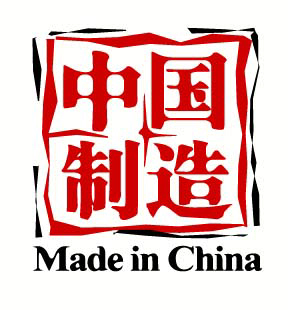
【Bloomberg】Backlash Against Chinese Products Ramps Up in India
In Mohit Gogia’s stationery and gift store in Noida, near India’s capital, the only decorative lights for sale ahead of last month’s festival of lights were Chinese made."India-made lights cost twice as much," said Gogia, as shoppers snapped up supplies for the Diwali celebration. "Customers aren’t willing to pay that."Two-way trade statistics tell the tale. India’s deficit with China has ballooned nine-fold over a decade to $49 billion in 2016 as China’s manufacturing edge stacks the odds against Prime Minister Narendra Modi’s three-year-old ‘Make-in-India’ program. The result: India’s current account deficit is worsening again, threatening the outlook for an economy already straining under the fallout of a snap ban on high-value notes a year ago and a new sales tax. Now -- a century after freedom fighters in colonial India launched a movement against British goods -- the backlash against Chinese products is ramping up. Swadeshi Jagran Manch, an economic policy group linked to the ruling Bharatiya Janata Party, drew more than 100,000 onto the streets in the capital New Delhi on Oct. 29 in a rally against the dominance of Chinese products. A picture in the local press showed protesters holding Indian flags and a poster of Chinese President Xi Jinping with a cross mark on it."This is the biggest-ever gathering to fight the dominance of Chinese goods," Arun Ojha, national convener of Swadeshi Jagran Manch, said in an interview in the hot, dusty protest site days ahead of the rally. "Our youth are losing jobs and we are becoming traders of Chinese products."Swadeshi Jagran Manch says its boycott movement is a "second war of economic independence" and claims support from farmers, trade and labor associations -- the same groupings that Modi will rely on for re-election in 2019. Protest leaders met with Defense Minister Nirmala Sitharaman following the demonstration. Calls to her mobile and to the office of the prime minister seeking comment went unanswered."This flood of Chinese imports fits in very uncomfortably with the priority of the Modi government to expand India’s manufacturing base," said Harsh Pant, professor of international relations at King’s College in London. "This trade deficit is now becoming a major headache. Though this is not unique to India-China economic ties, this is a major concern for Indian policy makers now that economic restructuring is a priority for New Delhi."In the last 10 years, there’s been a few episodes of rapid growth in India that led to rising external deficits and inflation and came to a halt because the government had to rein in demand in order to restore macroeconomic stability, said Louis Kuijs, head of Asia economics at Oxford Economics in Hong Kong."The imbalanced trade relationship reflects the fact that India’s manufacturing sector remains strongly underdeveloped," Kuijs said. "Unless it is able to develop its manufacturing sector so that it can produce a large share of the growing demand for goods in its economy, India’s economic growth will be constrained by rising current account deficits and/or inflation and their consequences."India and China’s frosty relationship has already been put to the test by a weeks-long military standoff in the Himalayas earlier in the year. Indeed, demands to boycott Chinese goods gathered momentum after that conflict on the Doklam plateau refreshed memories of a border war between the two nations in 1962, where China emerged the victor.Economically, India is losing out this time too: Taiwanese electronics giant Foxconn Technology Group has reportedly delayed a plan to set up a 3 billion rupees plant in the western Indian state of Maharashtra because of the standoff. Foxconn did not directly address whether its Maharashtra plant had been delayed. In a statement it said: "We are committed to the development of India’s technology and manufacturing sectors. Details regarding any new investments will only be announced once decisions have been made and all necessary approvals have been received."China has a different perspective on the trade relationship. The two nations could benefit from collaborating more, not less, said Wang Huiyao, director of the Beijing-based think tank Center for China and Globalization (CCG) .A boycott "doesn’t make any economic sense -- it’s an irrational move," he said. "China’s products and China’s experience can really benefit India."China’s Ministry of Commerce didn’t respond to faxed questions seeking comment.To be sure, Modi’s Made in India push hasn’t been without success. Foreign direct investment rose to a record $60 billion last financial year. But the program didn’t translate into lower imports from China, nor did it give any major push to manufacturing. "An inefficient indirect tax system, even after the goods and services tax, makes several inputs and final goods cheaper to import than buy domestically," said Amitendu Palit, senior research fellow at the National University of Singapore’s Institute of South Asian Studies. Ironically, the USB flash drives with electronic versions of brochures distributed at the Make-in India program announcement in 2014 were made in China."No one is capable of competing with the Chinese," said Neelam Deo, a director of Mumbai-based think tank Gateway House and a former diplomat.From Bloomberg,November 03, 2017
2017年11月6日 -
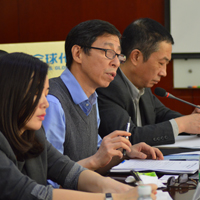
【People’s Daily Online】Trump’s visit to China to yield significant outcomes
U.S. President Donald Trump’s first state visit to China is an historic opportunity to boost cooperation between the world’s two largest economies, and a chance to tackle the problems that dampen bilateral ties, said experts.“The state visit comes at a time when the two nations’ relationship is solid and stable. Despite Trump’s unpredictable China policies and some possible conflicts on the trade and economic front, the future of the relationship is bright, as stable bilateral ties are crucial for their development,” Lu Jinyong, a professor at Foreign Trade University, told People’s Daily Online during a conference held by the Center for China & Globalization (CCG), a leading think tank in China, on Thursday.Lu’s remarks come ahead of Trump’s Nov. 8-9 visit to China, which many experts believe will mainly focus on security issues and energy cooperation, as well as seeking approaches to reduce friction on the trade imbalance and intellectual property rights.According to Xinhua News Agency, Chinese President Xi Jinping and Trump will also exchange in-depth views on China-U.S. relations, as well as major global and regional issues of common concern.Major concern in trade and security issues“Competition between China and U.S. in the security sphere is getting fiercer. U.S. authorities are worried about China’s fast development in this sphere, as the latter’s military force is now experiencing major changes regarding strategic guiding thoughts and military technologies,” said Teng Jianqun, director of the Department of U.S Studies at the China Institute of International Studies.Chinese President Xi Jinping in October called for fully transforming the people’s armed forces into a world-class military by the mid-21st century, adding that by the year 2020, mechanization will be basically achieved, and the modernization of national defense and the armed forces should be basically completed by 2035.Experts predict that during his visit, President Trump will reiterate the U.S. stance on major security issues, including the Korean Peninsula crisis, even though it is unlikely that he could coax China to reach a full consensus.“With little knowledge of China and much of his foreign policy regarding the Asian Pacific region not in place some 10 months into his presidency, Trump is unlikely to make a breakthrough with his Chinese counterparts in the security sphere, a major area of competition for the two nations now,” noted Teng.In addition to security, the two nations’ trade and economic cooperation will also become a crucial topic during Trump’s visit, added the experts.“Based on my calculation, China’s GDP will be double that of U.S. by the end of 2050, at which point China will have become a modern socialist country, according to its Two Centenaries Plan. Trump may hold talks with Xi on the development of trade ties in the next 30 years,” said Cui Fan, a professor of international trade at the University of International Business and Economics.According to Cui, competitive industries of China and U.S. will overlap more in the future, leading to even fiercer trade competitions between the two nations, while cooperation and contest in technology, talent, and capital will rise as new major concerns for bilateral economic ties.Lv Xiang, a research fellow at the Institute of World Politics, Chinese Academy of Social Sciences, noted that Trump’s visit will attach great importance to energy cooperation.“Around 40 companies will follow Trump to visit China, 10 of which are energy enterprises like Cheniere Energy, the only company sending America’s shale gas overseas. I think the two nations will surely discuss the possibility of building a port on the U.S. west coast to export natural gas, boosting bilateral cooperation in energy,” said Lv.Possible solutionsThough several conflicts and problems hindering bilateral ties remain, experts believe that deepened mutual trust and profound cooperation will benefit both nations in the long run.“Bilateral cooperation in infrastructure will provide great opportunities for both nations. Trump has rolled out plans to upgrade America’s infrastructure, but his $1 trillion plan is as elusive as ever. On the other hand, China has spent $11 trillion on infrastructure in the past decade, accumulating rich experience in building high speed rails, roads, and energy plants and proving itself to be a strong partner,” said Wang Huiyao, director of CCG.Meanwhile, the U.S. can also help China’s Belt and Road initiative, as the former has rich experience in economic cooperation with countries along the Belt and Road.“It would be a win-win solution for both nations if the U.S. is willing to participate in the Belt and Road initiative and the Asian Infrastructure Investment Bank,” added Wang.In terms of boosting the stability and development of the region, experts believe that promoting a Free Trade Area of the Asian Pacific (FTAAP) with both the U.S. and China’s participation can alleviate their conflicts in the region, seeking more mutual benefits.“Trump’s decision to withdraw from the Trans-Pacific Partnership has been denounced by many American leaders and other member nations, while the Regional Comprehensive Economic Partnership which involved China has yet to make any remarkable economic achievements. A FTAAP with both China and the U.S. may solve the current problems, but it would require hard work and mutual trust from both sides.”From People’s Daily Online,November 02, 2017
2017年11月6日 -
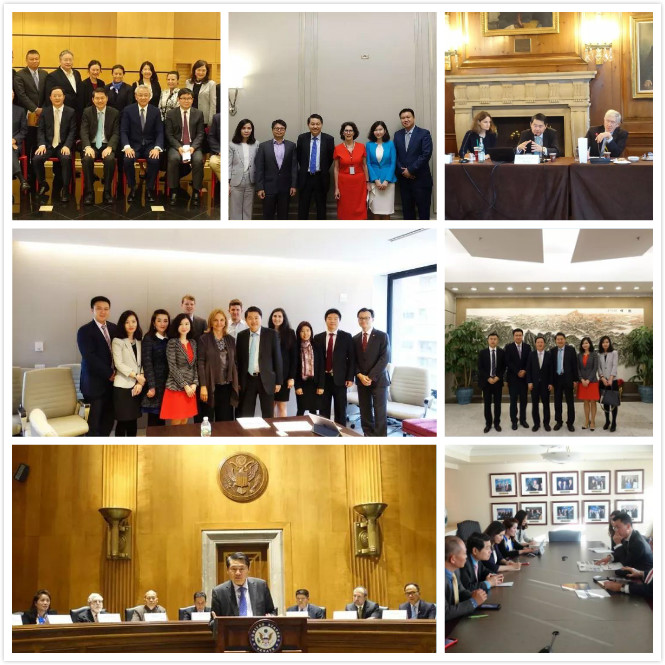
【新浪网】中国智库发布《中美共赢合作建议》报告
国际在线报道(记者 李雯婷):美国总统特朗普将于近期访华,全球目光聚焦中美合作。2日上午,中国与全球化智库发布了《中美共赢合作建议》报告,就中美如何更好管控分歧、实现合作共赢提出见解,多位中美关系专家也将在此次报告发布会上建言献策。 为了更好加强中美双方尤其是智库领域的交流,10月份中国与全球化智库(CCG)专家团深入美国华盛顿和纽约,就中美关系的核心问题走访了美国政界、商界、智库界的各大机构并与其中众多影响力人士进行了深入交流。2日上午,中国与全球化智库在北京发布了《中美共赢合作建议》报告,报告从中美基建、经贸、人才留学、太空合作等12个方面提出建议,努力构建出一个共赢合作的中美大国关系。中国与全球化智库主任王辉耀认为,中美可以在基础设施建设方面寻找新的合作契机,“我们发现基础设施在我们访问过程当中大家都很关注的,这是一个基点。因为美国基础设施确实现在很多都开始老化了,中美在基础设施方面非常互补,我们有高速列车,道路、能源、基建等等。提升对美国的基础设施投资,也可以成为促进中美合作很重要的一个方面。” 当天与会专家们还指出,当前中美联系越来越紧密,已经从简单的贸易领域扩展到投资、教育、旅游、人才、文化、能源、金融等领域所有经济领域。在这种新形势下,中美两国的经贸合作也步入新阶段。对外经济贸易大学国际经贸学院教授崔凡介绍:“我认为中美经贸关系重点是会从仅仅商品市场领域向要素市场领域扩张。商品市场我这里面主要指货物和服务,我们长期以来主要纠结的是贸易差额问题,那么后面的竞争和合作都很可能扩展到要素,这个要素主要指资本、技术、人才。” 《中美共赢合作建议报告》指出,中美两国作为世界上两个最大的贸易国、最大的经济体,两国经贸关系不仅影响两国的经济发展,也对世界经济发展起到重要的作用。对外经济贸易大学国际经贸学院教授卢进勇介绍,回顾近几十年来中美关系,大格局不断的向前发展,合作共赢将是中美关系的大局,“我觉得从现在来看,前两年我们的担心,或者说最近一年我们的担心现在应该基本过去了,我觉得中美关系大局基本确定,将处于稳定、平稳的这么一个发展的状态,也是一种互利互惠的状态。”文章选自新浪网,2017年11月2日
2017年11月6日 -
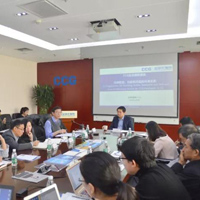
【经济参考】智库提出构建中美共赢合作建议
2017年11月8日,美国总统特朗普即将访华。全球化智库(CCG)专家团10月深入走访美国政商中心,与众多具有影响力的人士进行交流。基于此次调研成果和CCG在中美关系特别是经贸领域的研究,CCG发布调研报告《寻求稳定、均衡和共赢的中美关系》,从中美基建、经贸等方面提出努力构建共赢合作建议。 在《全球化智库(CCG)赴美调研报告:寻求稳定、均衡和共赢的中美关系》中,CCG提出对中美关系未来合作的建议:探讨成立中美基础设施投资基金,推动中美在基建领域的合作,邀请美国加入亚投行和“一带一路”;加大对美国的石油、天然气、农产品、商务客机等的进口,积极促进美方放松对华技术进口管控以缩减中美之间的贸易差额;中美尝试在太空、人才、互联网等领域加强合作,为全球治理创造正面事例;用全球价值链的解释,积极改变对美中贸易逆差的偏见;突出两国服务贸易在双方贸易中的地位,继续加大中美两国在旅游、留学和移民等领域的合作;中方积极引导中资制造业赴美进行绿地投资,增加当地就业,在利用当地廉价能源的同时,提升中资企业的国际竞争力;在坚持国民待遇前提下,中美双方进一步改善各自企业在对方国家的投资经营环境;中美双方加强在国债交易上的沟通和协调,促进双方在国债的交易中实现共赢;加强两国省/州一级政府间在基建、气候、能源等领域的合作;推进中美双边投资协议(BIT)或新的中美贸易协议谈判,减少双方相互投资的障碍,增加彼此之间市场开放的广度和深度;中美两国智库、贸易协会等非营利组织之间开展合作交流,承担起增进了解、消除误解、弥合分歧的“二轨外交”作用。文章选自经济参考,2017年11月3日
2017年11月6日